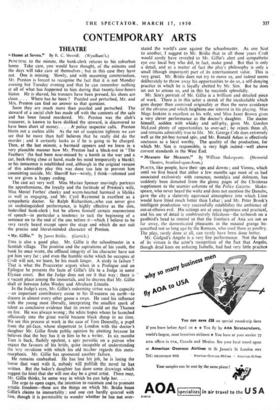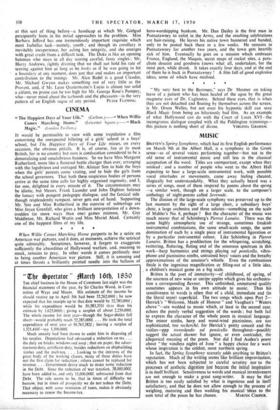“ Measure for Measure." By William Shakespeare. (Memorial Theatre, Stratford-upon-Avon.)
PLACES, like people, have their ups and downs ; and Vienna, which until we first heard that zither a few months ago most of us had associated exclusively with romance, nostalgia and dolmans, has suddenly been demoted from the glossy pages of the Christmas supplement to the seamier columns of the Police Gazelle. Shake- speare, who never heard the waltz and does not mention the Danube, gave the city a slatternly equivocal atmosphere into which Lime would have fitted much better than Lehar ; and Mr. Peter Brook's intelligent production very successfully establishes the ambience of out-at-elbows evil. His settings are at once ingenious and practical, and his use of detail is unobtrusively felicitous—the tarboosh on a gaolbird's head to remind us that the frontiers of Asia are not so far away, the domesticated pheasants in the moated grange be- queathed not so long ago by the Romans, who used them as poultry. The play, rarely done at all, can rarely have been done better.
Mr. Gielgud's Angelo is a very fine performance. Not the least of its virtues is the actor's recognition of the fact that Angelo, though dead keen on seducing Isabella, had had very little practice
at this sort of thing before—a handicap at which Mr. Gielgud percipiently hints in his initial approaches to the problem. Miss Barbara Jefford has one tremendously important requisite which most Isabellas lack—namely, youth ; and though its corollary is inevitably inexperience, her acting has integrity, and she emerges with great credit from a difficult task. The Duke is like an opening batsman who stays in all day scoring careful, fussy singles ; Mr. Harry Andrews, rightly divining that we shall not hold his rate of scoring against him as long as he looks as if he was going to hit a boundary at any moment, does just that and makes an important contribution to the innings. Mr. Alan Badel is a good Claudio, Mr. Michael Gwynn makes something out of very little as the Provost, and, if Mr. Leon Quatermaine's Lucio is almost too solid a citizen, no praise can be too high for Mr. George Rose's Pompey, who—never mind about the tarboosh and the pheasants—is the very
pattern of an English rogue of any period. PETER FLEMING.



































 Previous page
Previous page